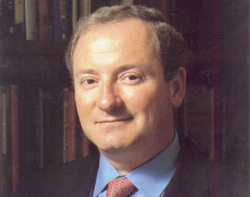Young Researcher in Prestigious Journal
Per Östberg of the Department of Finance and Management Science has written an article about so-called "neglected stocks" - a controversial topic. Recently, Östberg and his coauthor were informed that their article will be published in the very prestigious Journal of Financial Economics.
07.05.2008 - Knut André Karlstad (translated by Jessica Hartenberger)
The hypothesis is that some shares exist which are "forgotten" and because not everyone has information about these shares they generate more profit. The background can be found in a speech Robert Merton held for the American Finance Association in 1987, where he pointed out that incomplete information among investors causes a negative relationship between the amount of shareholders and profit levels.
"Merton incorporated this idea into a theoretical model. What he concluded was that those shares which are not known to everyone are more profitable. We used Swedish data, which is very good at indentifying how many individuals own each share. The shares which are owned by fewer individuals generate more profits," explains Östberg.

NOBLE PRIZE WINNER. Robert C. Merton won the Noble Prize in Economy in 1997, together with Myron S. Scholes.
Foto: Harvard Business School
Hot Debate
According to conventional financial theory, this should not be possible since it assumes that the market has complete information regarding all companies at all times. Thus, no shares could hide away in the market without the price of the share reflecting future profits.
"People look at this from different angles, and it has become a very hot debate. The topic is controversial and very exciting," says Östberg. He continues, "The question remains; why are these more profitable shares surviving in equilibrium?"
Östberg explains that when people invest by purchasing supposedly preferable shares they have heard of them before, and this can explain why "neglected stocks" exist.
Bonus in Sight
The article, Does Investor Recognition Predict Returns?, was written together with Andriy Bodnaruk from the University of Maastricht, who earned a doctorate degree alongside Östberg in Stockholm in 2005. To be published in an esteemed journal this early is very uncommon.
"I am very excited and feel that this is a step in the right direction," says Per Östberg. It has taken roughly four years to prepare the article. The Journal of Financial Economics is on NHH's list of journals which qualifies the authors for a publication bonus once the article is printed.
Homework
Publication is a laborious process, which takes time to get into. Typically the first draft is introduced at a conference before the manuscript is sent to a specific journal. The editor then gets a well-known researcher from the field to evaluate the contents and write commentary. In this way, it can go back and forth many times before it eventually becomes worthy of publication.
"One receives good, constructive feedback when such knowledgeable people read the draft. So, before writing a new draft, there is a great deal of effort put into implementing these suggestions. It is similar to having homework," explains Östberg.
|

